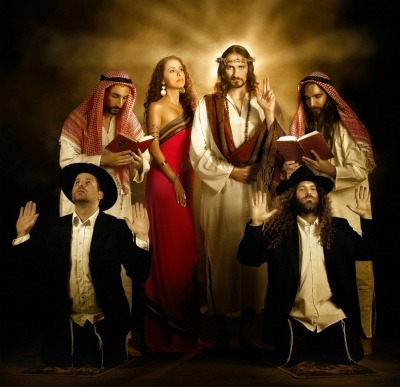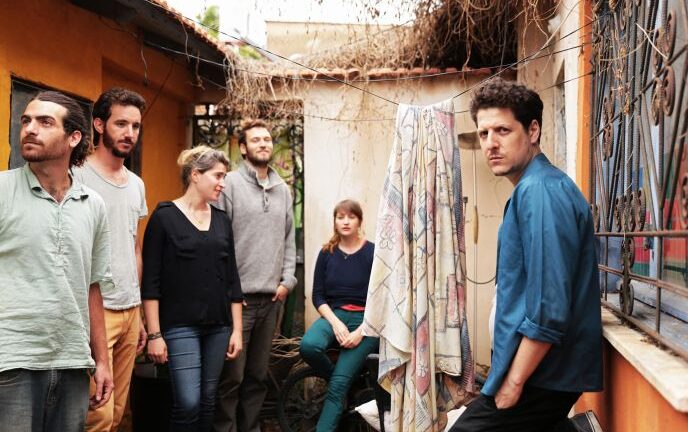Israeli heavy metal band Orphaned Land is inspiring fans in the unlikeliest of places.

Back when Kobi Farhi formed the Israeli heavy-metal band Orphaned Land back in high school 20 years ago, he never imagined that his obsession with loud, aggressive music would one day transform him into a goodwill diplomat.
But with the band’s growing popularity among metal-heads throughout the Middle East — including fans in places like Syria, Iran, Lebanon and especially Turkey, where diplomatic ties are fraying more every day — Farhi and Orphaned Land are serving the roles of mending relations and forging bonds between the two countries.
Earlier this month, the band performed before 5,000 fans at the Sonisphere Festival in Istanbul, and signed on to headline another metal festival in Ankara at the end of the month.
“Our fans were declaring that we and they are not our governments,” Farhi told ISRAEL21c in between the two festivals. “At the Istanbul show, it was a bizarre situation. We were onstage singing in Hebrew and there were fans from Iran, Tunisia, Lebanon, singing along with us while holding their countries’ flags — countries that don’t have relations with Israel.
“This took place at the same time as the Israeli ambassador to Turkey was asked to leave and the Israeli Embassy in Cairo was attacked. We’re the only Israelis getting along with them. We felt like messengers carrying a different voice, showing that there are other ways for people to get along.”
Arabic music, Hebrew lyrics
Orphaned Land has been having that effect on people ever since Farhi, who writes and sings the band’s songs, began to distance himself from the usual heavy-metal lyrical fare focusing on the darker aspects of society and began reflecting on the region he was living in and on the impact that religion has on its residents.
“We started to combine elements of Judaism and Arabic music, including instruments. It was an outstanding moment in the metal scene. Here comes this band playing Oriental instruments and singing in Hebrew,” says Farhi.
They knew they were onto something when in 2001, Farhi received his first email from a Muslim fan, with a picture of him sporting a tattoo of the band.
“I realized that we had something in our hands that was strong, and that even if it didn’t change the world, it would show another voice to the world. Now we have thousands of Muslim fans from around the region,” he says.
The band began to perform in Turkey on a regular basis, gaining more disciples each time.
The band’s 2004 album, “Mabool” (“Flood”) depicted three sons — one for each Abrahamic religion — who try to warn of a coming flood, and incorporates Yemenite chants and biblical verses. The latest album, last year’s acclaimed “The Never Ending Way of ORWarriOR,” features the Arab Orchestra of Nazareth, traditional Middle Eastern instruments such as saz, santur, Arabian flutes, cumbus and bouzouki, and the keyboard and mixing talents of Porcupine Tree’s Steven Wilson.
Breaking into Tel Aviv
Orphaned Land’s popularity outside of Israel belies the fact that within their borders, they’re not quite mainstream. Their music isn’t regularly played on the radio, and their performances are in clubs, not the Caesarea Amphitheater. However, the phenomenon surrounding their prominence in Turkey is raising a few eyebrows in Tel Aviv as well. On October 13, the band is performing at the Reading 3 Club coinciding with the release of a new live DVD.
“It’s a chance for Israelis who feel proud of what we’ve been doing but are not familiar with our music to come catch us and see what has caused this sensation,” says Farhi.
While enjoying the sudden prominence of his music, Farhi is hoping that his personal good fortune won’t be the only positive outcome of the band’s high profile. The diplomatic side of him coming to the forefront, he says that he hopes it will be the spark that can create a new reality between Turkey and Israel.
“We are small people, the band and its fans — humble people who are coming together for the music. If we can succeed in making it work, we’re setting an example for our leaders. Even though they’re a lot smarter than us, we expect them to learn from us and do the same.”
“Just yesterday, we were all over the front page of the main Ankara newspaper, with a headline saying that we were coming there in the name of peace, playing songs of peace. We are just musicians; we won’t change the world alone. But we do give another way and from that point on, [people] have to take it themselves. We are just the key to the door; they have to open it.”















